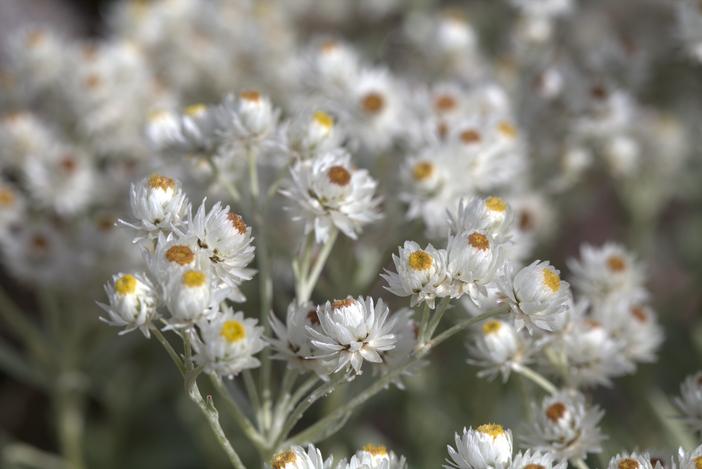Triple-Veined Pearly Everlasting
(Anaphalis triplinervis)
Triple-Veined Pearly Everlasting (Anaphalis triplinervis)
/
/

Averater
CC BY 4.0
Image By:
Averater
Recorded By:
Copyright:
CC BY 4.0
Copyright Notice:
Photo by: Averater | License Type: CC BY 4.0 | License URL: https://creativecommons.org/licenses/by/4.0 | Uploader: Averater | Publisher: Wikipedia Commons



























Estimated Native Range
Summary
Anaphalis triplinervis, commonly known as Triple-Veined Pearly Everlasting, is a perennial herb native to alpine and subalpine zones in the Himalayas and central Asia. It features grey-green, felted leaves and sprays of small, white flower heads that bloom in late summer and fall, providing attractive displays that are not particularly brilliant but are valued for their subtlety and texture. The plant typically forms clumps and is valued for its use as groundcover, with the added benefit of its blooms being popular for dried flower arrangements.
Triple-Veined Pearly Everlasting is appreciated for its low maintenance requirements and its ability to thrive in sunny locations with well-drained, somewhat dry soil. It is often used in rock gardens, borders, and as a complement to other perennials in garden beds. While it can tolerate part shade, it flourishes in full sun. This plant is drought-tolerant once established and prefers soils with medium drainage. It can be propagated by division in early spring or by seeds. Dividing in fall can lead to winter losses, so it is best avoided. Fertilization may be beneficial on poor soils in the spring, though it is not necessary for fertile conditions. Periodic division of older plants may be necessary to rejuvenate them every three to four years. In terms of design, Triple-Veined Pearly Everlasting pairs well with red or blue flowers to create visually appealing contrasts. The flowers are excellent for cutting and can be dried by hanging in a cool, shaded place, and they can be dyed for added color in arrangements. Potential problems include root rot in overly wet soils and susceptibility to aphids and leaf miners.CC BY-SA 4.0
Triple-Veined Pearly Everlasting is appreciated for its low maintenance requirements and its ability to thrive in sunny locations with well-drained, somewhat dry soil. It is often used in rock gardens, borders, and as a complement to other perennials in garden beds. While it can tolerate part shade, it flourishes in full sun. This plant is drought-tolerant once established and prefers soils with medium drainage. It can be propagated by division in early spring or by seeds. Dividing in fall can lead to winter losses, so it is best avoided. Fertilization may be beneficial on poor soils in the spring, though it is not necessary for fertile conditions. Periodic division of older plants may be necessary to rejuvenate them every three to four years. In terms of design, Triple-Veined Pearly Everlasting pairs well with red or blue flowers to create visually appealing contrasts. The flowers are excellent for cutting and can be dried by hanging in a cool, shaded place, and they can be dyed for added color in arrangements. Potential problems include root rot in overly wet soils and susceptibility to aphids and leaf miners.CC BY-SA 4.0
Plant Description
- Plant Type: Herb
- Height: 1.5-2 feet
- Width: 0.8-1.5 feet
- Growth Rate: Moderate
- Flower Color: White, Yellow
- Flowering Season: Summer
- Leaf Retention: Deciduous
Growth Requirements
- Sun: Full Sun, Part Shade
- Water: Medium
- Drainage: Medium, Fast
Common Uses
Bee Garden, Bird Garden, Butterfly Garden, Deer Resistant, Groundcover, Hummingbird Garden, Low Maintenance, Showy Flowers, Street Planting
Natural Habitat
Native to alpine and subalpine zones in the Himalayas and central Asia
Other Names
Common Names: Pearly Everlasting, Immortelle De L’Himalaya, Ulleternell
Scientific Names: , Anaphalis triplinervis, Antennaria triplinervis, Gnaphalium cynoglossoides, Gnaphalium perfoliatum, Antennaria triplinervis var. triplinervis, Gnaphalium cuneatum, Gnaphalium quintuplinerve,
GBIF Accepted Name: Anaphalis triplinervis (Sims) C.B.Clarke